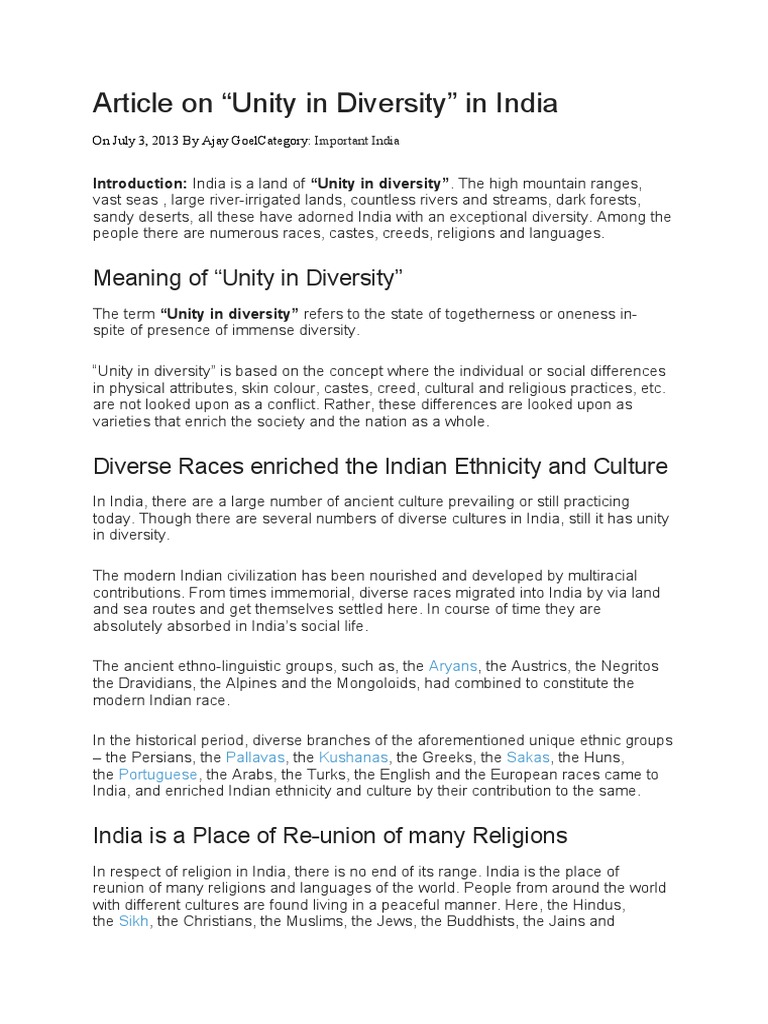In the contemporary world characterized by conflict and discord, the Bahá’í teachings present an encompassing vision of unity and diversity. The concept of “Citizens of One Common Fatherland” illuminates the imperative for humanity to rise above sectarian divides and embrace the rich tapestry of cultures, religions, and ethnicities that constitute our shared existence. This article elucidates the Bahá’í perspective on unity in diversity, emphasizing its profound implications for societal transformation and international relations.
The Bahá’í Faith posits that all humans are inherently interconnected, deriving from one source – a divine Creator, referred to as our “Common Father.” This foundational belief underpins the Bahá’í commitment to the essential oneness of humanity. Inherent in this understanding is the rejection of any notion of superiority based on race, nationality, or social status. Instead, the teachings encourage an appreciation for diversity as a manifestation of the Creator’s grand design. The richness of human experience is celebrated, seen not as a source of division but as a vital ingredient in the collective advancement of civilization.
At the heart of this vision is the belief that in recognizing our shared humanity, individuals can transcend the barriers that have historically led to strife and misunderstanding. The notion of a “Common Fatherland” evokes a sense of belonging to a global community, where individuals are motivated not by parochial interests but by a collective desire for peace and justice. Such a paradigm shift engenders a spirit of cooperation, urging citizens to contribute positively to the welfare of all.
Unity in diversity is not merely a theoretical abstraction; it engenders practical implications for governance and social policy. The Bahá’í paradigm advocates for the establishment of equitable systems that honor and reflect the diverse needs and contributions of all community members. In political realms, this translates into inclusive governance practices that prioritize collaboration over conflict. There exists an urgency to develop institutions that facilitate dialogue, foster understanding, and promote collaborative problem-solving. This shift is crucial for navigating the complexities of modern society, where polarization threatens to undermine social cohesion.
The Bahá’í teachings further assert that true unity is achievable only through the active engagement of individuals seeking to align their actions with spiritual principles. This alignment is critical in cultivating an environment conducive to mutual respect and collective progress. Indeed, actions taken in the spirit of service are foundational to the Bahá’í approach. The emphasis on individual responsibility culminates in a collective effort to actualize the principles of justice, honesty, and compassion in all facets of life—personal, communal, and global.
Education is heralded as a cornerstone in this transformative vision. Bahá’í teachings underscore the necessity of promoting a universal education system that recognizes and nurtures the innate potential of every individual. Such an education should aim not only at imparting knowledge but also at fostering moral and spiritual development. The cultivation of empathy and understanding through education is paramount; it equips individuals to appreciate differing perspectives and to engage meaningfully with others. As learners embrace diversity, they become ambassadors of unity, championing the cause of collaboration across cultural and geographical boundaries.
This educational imperative dovetails with the broader Bahá’í commitment to social justice. In a world rife with inequality, the teachings advocate for the elimination of prejudice in all forms. Addressing systemic inequities—whether based on race, gender, or socioeconomic status—is essential to achieving a just society. The work of promoting equality is both a collective endeavor and a personal calling, propelled by the understanding that justice is intrinsic to the fabric of unity. When individuals commit to fostering inclusive environments, they contribute to dismantling the barriers that divide.
A significant aspect of realizing unity in diversity is the importance of dialogue. Bahá’í teachings encourage sincere and respectful discourse that seeks to understand rather than to win. Engaging in conversations that transcend cultural differences fosters empathy and enhances mutual respect. In spaces of dialogue, individuals can confront misconceptions, share experiences, and build bridges across divides. Through this engagement, a common understanding emerges, paving the way for collaborative action toward shared objectives.
The practical application of these principles extends beyond personal interactions and into the cosmos of international relations. The Bahá’í approach to global governance advocates for the establishment of a system of collective security and cooperation among nations. International institutions should reflect the interconnectedness of humanity, fostering peace through equitable practices and global solidarity. The urgency for collective action on pressing issues such as climate change, poverty, and conflict resolution underscores the necessity of uniting for the common good, asserting that a shared responsibility for the planet is imperative for survival.
In conclusion, the Bahá’í vision of “Citizens of One Common Fatherland” encapsulates a transformative ethos that beckons humanity to embrace unity in diversity. It challenges individuals to reconsider their roles within the global community, fostering a sense of belonging to the larger human narrative. By advocating for inclusive practices, equitable social structures, and sincere dialogue, the Bahá’í teachings extend an invitation to co-create a world where differences are celebrated and harmony prevails. In a time when divisions threaten to eclipse our shared humanity, the vision of unity offers a promising shift in perspective, urging a collective journey towards a more inclusive and compassionate world.
